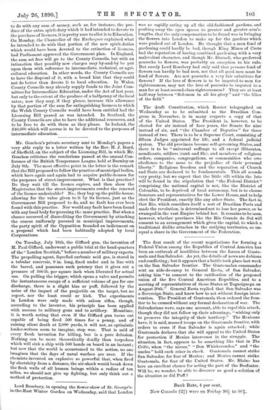The draft Constitution, which Reuter telegraphed on Wednesday as to
be submitted to the Brazilian Con- gress in November, is in many respects a copy of that of the United States. The President is, however, to be elected for six instead of four years, the Senate for nine instead of six, and "the Chamber of Deputies" for three instead of two. There is to be a Supreme Court, consisting of fifteen Judges appointed for life, and a federal judicial system. The old provinces become self-governing States, and there is to be "universal suffrage to all except illiterates, mendicants, soldiers (rank and file), and members of religious orders, companies, congregations, or communities who owe obedience to the same to the prejudice of their personal liberty." Religious freedom and the separation of Church and State are declared to be fundamentals. This all sounds very pretty, but we expect that the little rift within the lute will be found in the stipulation that "the Federal District" comprising the national capital is not, like the District of Columbia, to be deprived of local autonomy, but is to choose Senators and representatives for the Lower House, and to help elect the President, exactly like any other State. The fact is, that Rio, which considers itself a sort of Brazilian Paris and made the revolution, is determined not to lose her power, or be swamped in the vast Empire behind her. It remains to be aeon, however, whether provinces like the Rio Grande do Sul will consent to an arrangement which gives the capital, to which a traditional dislike attaches in the outlying territories, so un- equal a share in the Government of the Federation.


































 Previous page
Previous page